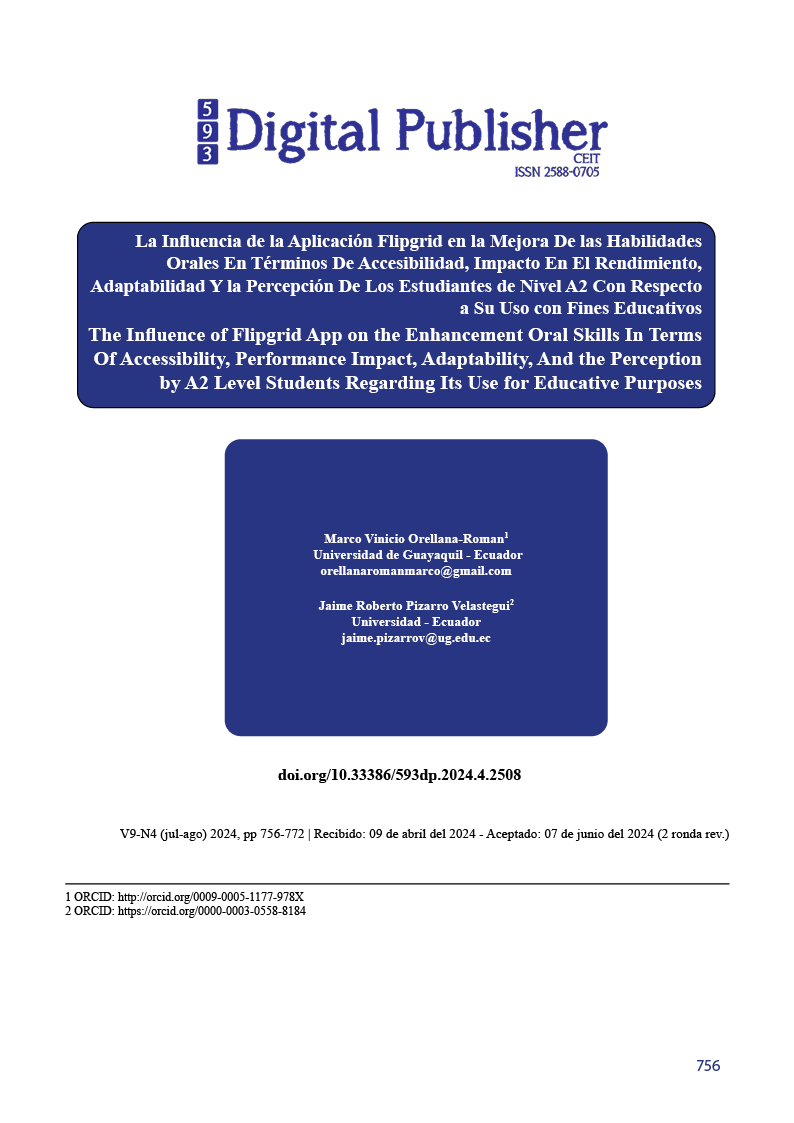La influencia de la aplicación Flipgrid en la mejora de las destrezas orales en términos de accesibilidad, impacto en el rendimiento, adaptabilidad y percepción de los estudiantes de nivel A2 sobre su uso con fines educativos
Contenido principal del artículo
Resumen
Este artículo de investigación profundiza en el impacto de Flipgrid, una aplicación digital, en la competencia oral de los estudiantes y los resultados generales de aprendizaje en entornos EFL. A través de un análisis exhaustivo de la investigación existente, incluidos los estudios de Amirulloh, Damayanti y Citraningrum (2021), Syahrizal y Pamungkas (2021) y Difilippantonio-Pen (2020), este trabajo evalúa la efectividad, los beneficios, los desafíos y la influencia general de Flipgrid en las habilidades de comunicación oral. También investiga las percepciones y actitudes de los estudiantes hacia Flipgrid, extrayendo ideas del estudio de Lainez (2022) en la Universidad Estatal de la Península de Santa Elena en Ecuador, para proporcionar una visión general integral e inclusiva del papel de Flipgrid en la mejora de las habilidades orales de los estudiantes de nivel A2 con fines educativos.
Descargas
Detalles del artículo

Esta obra está bajo una licencia internacional Creative Commons Atribución-NoComercial-CompartirIgual 4.0.
1. Derechos de autor
Las obras que se publican en 593 Digital Publisher CEIT están sujetas a los siguientes términos:
1.1. 593 Digital Publisher CEIT, conserva los derechos patrimoniales (copyright) de las obras publicadas, favorece y permite la reutilización de las mismas bajo la licencia Licencia Creative Commons 4.0 de Reconocimiento-NoComercial-CompartirIgual 4.0, por lo cual se pueden copiar, usar, difundir, transmitir y exponer públicamente, siempre que:
1.1.a. Se cite la autoría y fuente original de su publicación (revista, editorial, URL).
1.1.b. No se usen para fines comerciales u onerosos.
1.1.c. Se mencione la existencia y especificaciones de esta licencia de uso.
Citas
Aby Bakar, N., Latiff, H., & Hamat, A. (2013). Enhancing ESL Learners Speaking Skills through Asynchronous Online Discussion Forum. Asian Social Science, 224- 233.
Akhter, S., Haidov, R., Rana, A., & Qureshi, A. (2020). Exploring the Significance of Speaking Skill for EFL Learners. . Pal Arch´s Journal of Archaeology of Egypt/Egyptology, 17.
Al Jamal, D., & Al Jamal, G. (2014). An investigation of the difficulties faced by EFL undergraduates in speaking skills. English Language Teaching, 19-27.
Amirulloh, D., Damayanti, I., & Citraningrum, E. (2020). A Pathway to Enhance Students’ Speaking Performance. Atlantis Press, 90-91.
Arends, R. (2012). Learning to Teach. New York: McGraw-Hill Companies Inc. . Bartlett, M. (2018). Using Flipgrid to Increase Students' Connectedness in an Online .
Learn Magazine.
Bhattacharjee , N. (2018). Developing Speaking Skill at Secondary and Higher Secondary Levels. Stamford Journal of English, 4.
Budiarta, I., & Santosa, M. (2020). TPS-Flipgrid: Transforming EFL Speaking Class in the 21st century. Journal of English Education, 2-60.
Difilippantonio-Pen, A. (2020). Virtual Commons - Bridgewater State University.
Fuente: Flipgrid and Second Language Acquisition Using Flipgrid to Promote Speaking Skills for English Language Learners.: https://vc.bridgew.edu/theses/75/
Dueñas, F., Cardozo, D., & Peña, C. (2015). Developing Speaking Skills Through Speaking - Oriented Workshops. Enletawa Journal, 35-45.
Fajardo, M., & Argudo, A. (2022). Oral skills and Flipgrid platform in English as a foreign language learners. Revista Arbitrada Interdisciplinaria KOINONIA.
Green, T. &. (2018). Flipgrid: Adding Voice and Video to Online Discussions. Tech Trend, 62, 128.
Hutabarat, A., & Simanjuntak, D. (2019). A Phenomenological Study: Speaking Anxiety Overwhelms English Learners. JELPEDLIC, 44-58.
Inayah, R., & Lisdawati, I. (2017). Exploring Students’ Difficulties in Speaking English and Their Attitude. JELPEDLIC, 12-23.
Jiang, Y. & Peng, J. (2023): Exploring the relationships between learners’ engagement, autonomy, and academic performance in an English language MOOC. Computer Assisted Language Learning, DOI: 10.1080/09588221.2022.2164777. Link:
https://doi.org/10.1080/09588221.2022.2164777
johnson, K., & Johnson, H. (1998). Encyclopedic dictionary of applied linguistics.
Blackwell Publishing.
Lai, T., Lien, N., & Vu, N. (2021). FLIPPGRID APP FOR TEACHING SPEAKING SKILLS STUDENTS' PERCEPTIONS AND PERFORMANCE IMPACT Journal of
Foreign Students, 37, 157 - 167. Obtenido de https://doi.org/10.25073/2525- 2445/vnufs.4746
Lainez, I. (2022). FLIPGRID FOR THE DEVELOPMENT OF ENGLISH PRONUNCIATION IN A2 LEVEL STUDENTS. Santa Elena, Ecuador.
Kayi, H. (2006). Teaching speaking: Activities to promote speaking in a second language. The Internet TESL Journal, 1-6.
Mahmoudi, S., & Mahmoudi, A. (2015). Internal and external factors affecting learning English as a foreign language. International Journal of Language and Linguistics, 313-322.
Mann, K & MacLeod, A. Constructivism: learning theories and approaches to research.
Book Editor(s): ennifer Cleland, Steven J. Durning. First published: 15 July 2015 https://doi.org/10.1002/9781118838983.ch6
McLain, T. (2018). Integration of the video response app Flipgrid in the business writing classroom. Integration of the Video REsponse App Flipgrid in the Business Writing Classroom, 68-75.
Richards, J.C. & Rodgers, T. Approaches and Methods in Language Teaching. Cambridge University Press. 2014. 3rd edition. ISBN: 9781009024532. https://doi.org/10.1017/9781009024532
Seven, M. (2020). Motivation in language learning and teaching. Net Journals, 62-70. Stoszkowski, J. (2018). Using Flipgrid to Develop Social Learning. Compass Journal of
Learning and Teaching, 1-2.
Syahrizal, T., & Pamungkas, M. (2021). Revealing Students’ Responds on the Use of Flipgrid in Speaking Class: Survey on ICT. Journal of English Language pedagogy. , 96-107.
Taylor, S. (2020). Strategies for Using Flipgrid in the Kinesiology Classroom. . David Publishing, 230-235.
Tuan, N., & Mai, T. (2015). Factors affecting students' speaking performance at le thanh hien high school. Asian Journal of Educational Research, 8-23.
Tucker, S., PhD. TRANSFORMING PEDAGOGIES: Integrating 21ST Century Skills and Web 2.0 Technology. 2014. Turkish Online Journal of Distance Education- TOJDE January 2014 ISSN 1302-6488 Volume: 15 Number: 1 Article 12. https://dergipark.org.tr/tr/download/article-file/155703
Tuyet, T., & Khang, N. (2020). The Influences of the Flipgrid app on Vietnamese.
European Journal of Foreign Language Teaching, 128-130.
UCE. Factors that Prevent the English Oral Production of Students. Quito, Ecuador.
Revista Kronos, 2002. https://revistadigital.uce.edu.ec
Vygotsky’s Sociocultural Theory Of Cognitive Development By Saul McLeod, PhD. Updated on October 24, 2023. https://www.simplypsychology.org/vygotsky.html?ezoic_amp=1&fb_comment_id
=500779888714_15217241
Webb, M & Doman, E. (2019): Impacts of flipped classrooms on learner
attitudes towards technology-enhanced language learning, Computer Assisted Language Learning, DOI: 10.1080/09588221.2018.1557692. To link to this article: https://doi.org/10.1080/09588221.2018.1557692
Yunus, J. (2021). The Attitudes of Pupils towards using Flipgrid in Learning English Speaking Skills. International Journal of Learning, Teaching and Educational Research, 151-168.



